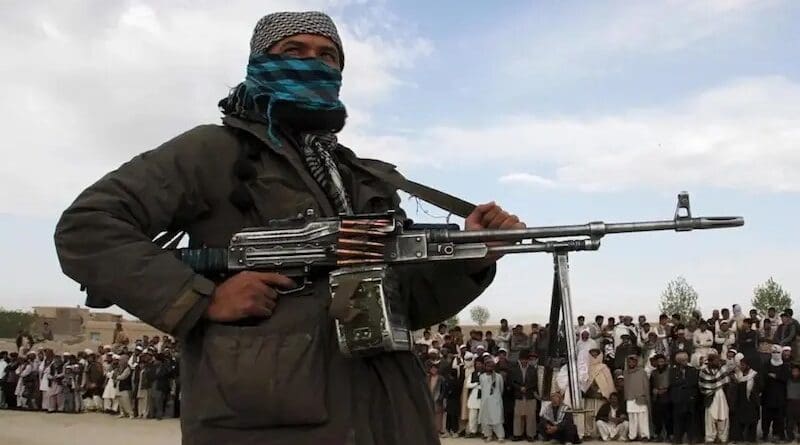Regional Quagmire: The Dynamics Of TTP Support Among Neighboring States – OpEd
By Saima Afzal
The Tehrik-e-Taliban Pakistan (TTP) is a militant organization fighting against the state in Pakistan, with thousands of fighters also operating in Afghanistan. It emerged in 2007 as an umbrella organization of various militant groups operating in the tribal areas of Pakistan. Their main objective was to establish their version of Islamic law and challenge the writ of the state. Since that time, the TTP has received logistical and moral backing from neighboring states, notably Afghanistan, aimed at undermining Pakistan’s internal security. Afghan Taliban and the TTP shared the same ideology and perceived the Pakistani government’s alliance with the United States and its military operations against militants in the tribal areas as hostile actions against their shared goals of establishing Islamic rule.
In the past, the Pakistani government with military collaboration has taken various measures including Operation Zarb-e-Azb and Operation Rah-e-Nijat to counter TTP activities and ensure the safety of its citizens. These military operations were aimed at targeting TTP and other militant groups in the tribal areas of Pakistan. They involved large-scale ground offensives, airstrikes, and intelligence-led operations to dismantle TTP’s infrastructure and disrupt their networks. These operations were successful in clearing many areas previously under TTP’s control and significantly disrupting their networks. However, the emergence of the Taliban regime in Kabul released various prisoners from jails that were captured by the previous Government including thousands affiliated with terrorist groups such as Al Qaeda, Islamic State, and the TTP. Subsequently, the resurgence of the TTP in Pakistan became evident not only through its escalating attacks within the country but also through ancillary activities.
However, in 2020, a United Nations report mentioned there were more than 6,000 TTP militants in Afghanistan. TTP has been operating safely from within Afghanistan since the Taliban came into power despite their assurance that Afghan soil would not be used for any terrorist activities. The TTP poses a persistent security challenge for Islamabad. Following the Taliban’s seizure of power in Afghanistan, four significant developments have marked the TTP’s renewed strength including a series of mergers, the adoption of a centralized organizational structure emulating the Afghan Taliban insurgency, growing operational activity, and a sharp strengthening in media operations.
The latest UNSC report (by the Monitoring Team on ISIL (Daesh) & Al Qaeda/Taliban, has categorically stated the presence and safe havens of regional and international terrorist groups (TTP, ISKP, AQ, ETIM) in Afghanistan and the support being rendered to them by the IAG. The UNSC report states that “the high concentration of terrorist groups in Afghanistan undermines the security situation in the region” while emphasizing the existence of al-Qaeda, ISKP, TTP, and other foreign terrorists, as well as their affiliations with the Afghan Taliban. The report vindicates Pakistan’s repeated stance about TTP safe havens in Afghanistan. As per the report, “TTP was further strengthened and emboldened, increasing attacks with a broader degree of autonomy to maneuver. The Taliban are generally sympathetic to TTP aims. Besides supplying weapons and equipment, Taliban rank and file, Al-Qaida core and AQIS fighters assisted TTP forces in cross-border attacks.”
Pakistan has been the most affected by TTP’s activities. The group has carried out numerous attacks within Pakistan, targeting civilians, security forces, and government institutions. The impact of TTP’s activities has had a significant toll on the security and stability of the country. Regional security concerns related to TTP are also primarily centered around the potential for cross-border terrorism and the destabilization of the region. TTP has been involved in carrying out attacks within Pakistan, which has led to concerns about the spillover of violence into neighboring countries. Cooperation and coordination among regional states are crucial in addressing these security challenges.
There have been reports indicating that TTP militants have sought refuge and set up bases in specific areas of Afghanistan. These sanctuaries afford them a secure environment to regroup, strategize for attacks, and conduct cross-border operations. Video statement of an Afghan terrorist arrested from Pishin, Balochistan on April 23, 2024. Arrested terrorist Habibullah alias Khalid son of Khan Muhammad is a resident of Spin Boldak area of Afghanistan. He confessed his involvement in terrorist activities in Pakistan in the confessional statement. It indicates that an attack in the Pishin area of Balochistan was planned from Afghanistan and Afghan terrorists were arrested. Rocket launchers, grenades, and weapons were provided to two of our personnel for the attack. Reportedly, on 7th March 2024, three terrorists, planning to attack Adiyala Jail, apprehended by Pakistan’s CTD and police in a joint operation also belonged to Afghanistan.
Both Pakistan and Afghanistan need to collaborate closely in addressing this issue and taking coordinated actions to eliminate these sanctuaries and disrupt TTP’s activities. Cooperation between the two countries is crucial in ensuring regional security and stability. Pakistan and Afghanistan have taken several specific actions to target TTP sanctuaries. They have conducted joint military operations, sharing intelligence and coordinating efforts to disrupt TTP’s activities. Border management and enhanced security measures have been implemented to prevent militants from crossing the border. Additionally, both countries have engaged in diplomatic discussions and bilateral meetings to strengthen cooperation and develop strategies to eliminate TTP sanctuaries.
In short, being a neighbor, Pakistan is particularly suffering because of the terrorist attacks by TTP, BLA/ BRA, and ISKP who openly operate from Afghanistan. It is time now for the Afghan government to act against terrorist groups in true letter and spirit to ensure regional/ global peace. Additionally, dressing these challenges requires ongoing efforts and cooperation between Pakistan and Afghanistan. It’s a complex issue, but with continued dedication and collaboration, progress can be made in countering the threats posed by TTP.

